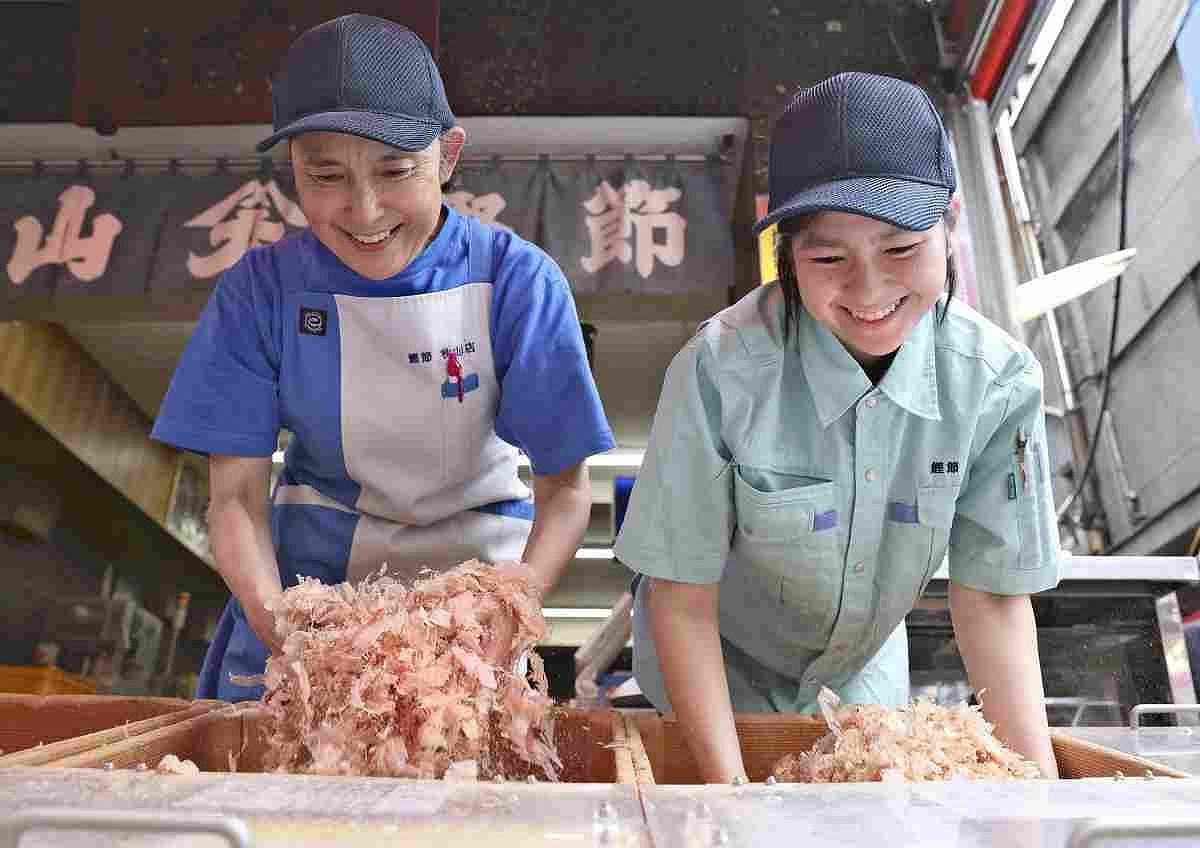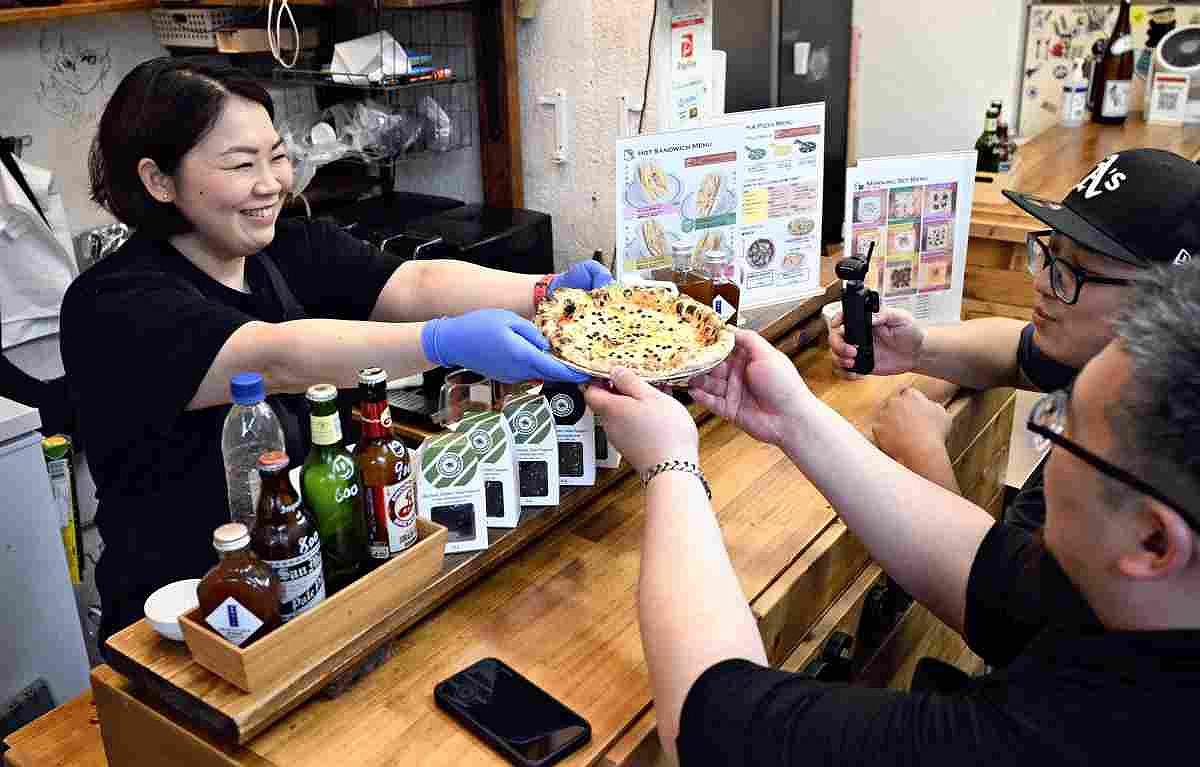Tsukiji Outer Market; surviving and thriving / Shop Heirs Refresh Tokyo’s Gourmet Market; Finding New Ways to Reach Customers to Keep the Market Growing

Mayuko Akiyama, right, and her mother, Kumiko, mix dried bonito flakes.
The Yomiuri Shimbun
11:38 JST, June 28, 2024
The Tsukiji Outer Market went through tough times following the relocation of the main market and then restrictions from the pandemic, but it is thriving again as the original market area undergoes a massive redevelopment nearby. This is the third and final installment in a series on its attractions and charms.
***
The freshly shaved dried bonito flakes exude a sweet and smoky aroma as Mayuko Akiyama hand mixes them to keep moisture out.
Wooden boxes of the flakes, known as “katsuobushi,” sit on display outside of Akiyama Shoten, a wholesaler in the Tsukiji Outer Market in Chuo Ward, Tokyo.
“Do you want to try a taste? It goes good on rice,” Akiyama, 28, says to tourists visiting the shop, offering the flakes with a welcoming smile.
Her expression quickly changes to that of a serious connoisseur the moment she sees that a professional cook has come to her shop.
“This dried bonito is perfect for a clear broth soup with hamo [daggertooth pike conger], which has a delicate taste,” she says to the customer.
Akiyama Shoten was founded in 1916. Akiyama was a third-year high school student when her father, who was the third-generation owner, died at 54. Her mother Kumiko, now 65, succeeded him as the owner, but she was not used to running the shop. Akiyama herself had entered university intending to become a zookeeper. However, she started working at the shop immediately after graduation, thinking that she must learn to manage the establishment.
When she was living on her own as a student, her family sent packages of the bonito flakes. She used the flakes to make soup stock and was warmed by the familiar taste. All of her friends said that simmering dishes were difficult to make, but she found it easy when she used a strong bonito flake stock. She realized the true depth of bonito flakes.
“I want to deliver the mild umami taste and aroma of our dried bonito flakes to customers,” she thought.
To help support her mother, she learned how to smoke and shave dried bonito from the shop’s veteran workers. She now posts videos on social media making dishes that use bonito flakes.
Dried bonito flakes are said to originate from katauo, which means “hard fish” and appears in The Kojiki, Japan’s oldest historical chronicle.
“I think it has remained in use for over 1,000 years because it’s a building block of home cooking,” Akiyama said. “Now, my dream is to get more people to make their own soup stock.”
Successors, newcomers
Though established stores in the outer market with a long history strive for survival as heirs take over, there are also many newcomers from outside who are opening shops in the market.

Yuko Iwase serves a pizza sprinkled with raw pepper to a customer.
It was in Cambodia that Yuko Iwase, 38, the owner of Tsukiji Peppers Cafe, encountered raw pepper for the first time during a trip to the country after her 30th birthday. Amazed by the fresh and hot taste of raw pepper, she began importing and selling it in 2019. Her shop also serves pizza and curry using ingredients from Tsukiji, all seasoned with pepper.
When Iwase was little, her father would take her to the outer market, where they ate breakfast together before she went to school. It was a family tradition to go to the market with the whole family at the end of the year to buy ingredients for osechi New Year’s meals. She chose Tsukiji as the place to open her shop without a second thought because “It’s a place where you can get the finest ingredients and the best knowledge. There’s no better place to establish a new food culture,” she said.
Iwase initially steeled herself for the incoming customers, thinking that buyers at Tsukiji were all strict connoisseurs. But it turned out that the owners of nearby shops recommended her store to customers, and she did the same for them. They kindly used raw peppers from her shop.
“The warm-hearted people in Tsukiji have helped me a lot,” she said.
There are also new projects being spread by those who refuse to become complacent about the current situation in Tsukiji and are looking to the future.
One such project is the online shopping site “Tsukiji Otoriyose Ichiba” (Tsukiji order market), which was launched in 2013 with about 20 shops from the outer market. The number has since increased to about 150 shops. The project boasts that professionals with discerning eyes from those shops select seasonal delicacies, amounting to 10,000 ingredients, from meat and seafood to fruit and vegetables. During the COVID-19 pandemic, the website’s sales jumped tenfold and helped the brick-and-mortar shops survive when the number of customers sharply declined.
At the outer market, shops are also proactively participating in events at various locations, including those in department stores. In 2019, they opened “Mini Tsukiji” inside the Jingu Baseball Stadium. The shop provides about 30 different dishes, such as rice bowls with tuna steak and yakitori grilled chicken skewers. It was very popular with customers, who happily said the food was fresh and went well with beer. This season, the shops also started selling some food from carts in the stadium’s concourse.
“In the old days, we just waited at our shops for the customers,” said Masahiro Terada, 60, the chairman of the promotion association for shops in the outer market. “We need to do more than that and unite to spread the word of Tsukiji’s appeal, which will help to further vitalize the outer market.”
Most Read
Popular articles in the past 24 hours
-

Voters Using AI to Choose Candidates in Japan's Upcoming General ...
-

Japan's Snow-Clad Beauty: Camellia Flowers Seen in Winter Bloom a...
-

Monkey Strikes Junior High School Girl from Behind in Japan's Yam...
-

Genichiro Inokuma's Mural in Ueno Station That Gave Hope in Postw...
-

Senior Japanese Citizens Return to University to Gain Knowledge, ...
-

Heavy Snow Linked to 30 Deaths across Japan since Late Jan.; JMA ...
-

Tokyo Police Arrest Head of Resignation Assistance Firm
-

Foreign and Security Policy: Political Parties Must Discuss How T...
Popular articles in the past week
-

Japan Institute to Use Domestic Commercial Optical Lattice Clock ...
-

Australian Woman Dies After Mishap on Ski Lift in Nagano Prefectu...
-

Foreign Snowboarder in Serious Condition After Hanging in Midair ...
-

Chinese Embassy in Japan Reiterates Call for Chinese People to Re...
-

Narita Airport, Startup in Japan Demonstrate Machine to Compress ...
-

Toyota Motor Group Firm to Sell Clean Energy Greenhouses for Stra...
-

Sakie Yokota, Last Surviving Parent of a North Korea Abductee, Ur...
-

Beer Yeast Helps Save Labor, Water Use in Growing Rice; Govt Hope...
Popular articles in the past month
-

Univ. in Japan, Tokyo-Based Startup to Develop Satellite for Disa...
-

JAL, ANA Cancel Flights During 3-day Holiday Weekend due to Blizz...
-

China Confirmed to Be Operating Drilling Vessel Near Japan-China ...
-

China Eyes Rare Earth Foothold in Malaysia to Maintain Dominance,...
-

M6.2 Earthquake Hits Japan's Tottori, Shimane Prefectures; No Tsu...
-

Japan Institute to Use Domestic Commercial Optical Lattice Clock ...
-

Japan, Qatar Ministers Agree on Need for Stable Energy Supplies; ...
-

Japan, Italy to Boost LNG Cooperation; Aimed at Diversifying Japa...
Top Articles in Society
-

JAL, ANA Cancel Flights During 3-day Holiday Weekend due to Blizzard
-

Record-Breaking Snow Cripples Public Transport in Hokkaido; 7,000 People Stay Overnight at New Chitose Airport
-

Australian Woman Dies After Mishap on Ski Lift in Nagano Prefecture
-

Foreign Snowboarder in Serious Condition After Hanging in Midair from Chairlift in Nagano Prefecture
-

Train Services in Tokyo Resume Following Power Outage That Suspended Yamanote, Keihin-Tohoku Lines (Update 4)
JN ACCESS RANKING
-

Univ. in Japan, Tokyo-Based Startup to Develop Satellite for Disaster Prevention Measures, Bears
-

JAL, ANA Cancel Flights During 3-day Holiday Weekend due to Blizzard
-

China Confirmed to Be Operating Drilling Vessel Near Japan-China Median Line
-

China Eyes Rare Earth Foothold in Malaysia to Maintain Dominance, Counter Japan, U.S.
-

Japan Institute to Use Domestic Commercial Optical Lattice Clock to Set Japan Standard Time







